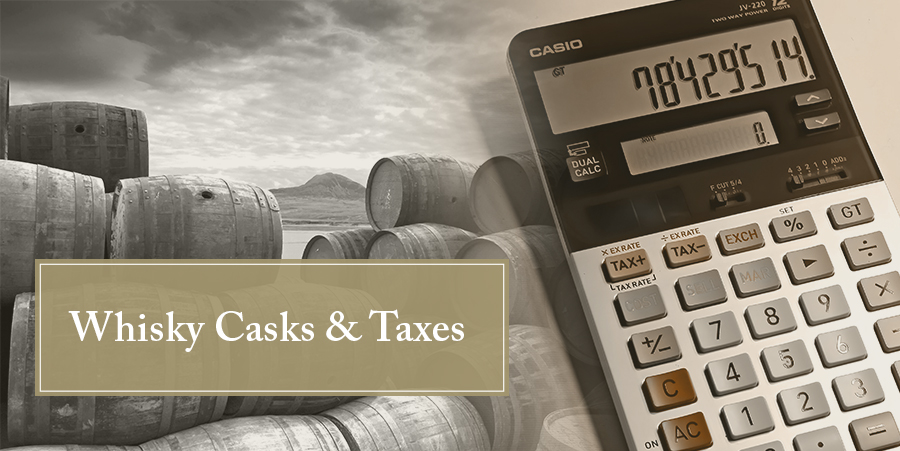Taxation, as Benjamin Franklin famously said, is one of life’s great inevitabilities. However, as every investor knows, the way tax is applied to their investments is far from certain. Liabilities vary greatly depending on the type of products you hold and what other income you receive. However, when considering where to put your money, the tax implications should always be front and centre.
While the specific tax treatment of whisky casks varies from country to country, in nearly every instance whisky cask ownership can offer some unique tax benefits to investors. So, when the time comes to buy a whisky cask, what do investors need to know about the tax liabilities surrounding their investment?
A tax-free investment in the UK
The good news is that, for tax purposes in the UK, HMRC defines whisky casks as a wasting asset, which means they are not liable for capital gains tax. A wasting asset is defined as an asset that has a predictable life of 50 years or less, so, when the time comes to dispose of that asset any gain or loss is exempt from taxation.
In fact, despite being classified as a ‘wasting asset’, whisky casks are not subject to the decline in value that can affect other assets in that category (aside from the small annual ‘angels’ share’ loss of liquid due to evaporation). On the contrary, whisky casks actually increase in value substantially over the years as the liquid matures and improves inside the cask.
This rule applies even though alcohol is typically a highly taxed asset. If the cask is bottled, duty and VAT will have to be paid on it. You will also need to get the proper licences to sell your bottles and may need to pay income tax on the profits. However, if a full cask of whisky is sold to another investor the profits of the sale will not be liable for tax. This makes investing in whisky casks a highly tax-efficient option for investors in the UK building their portfolios or planning their estate.
What rules apply in other regions?
While the advantages inherent to whisky cask investment in the UK are not common in other tax jurisdictions, there are still opportunities for investors in other markets to make their investment more tax efficient.
In the United States, for example, tangible assets that are passed to beneficiaries as part of an estate receive a step-up in basis, allowing beneficiaries to avoid capital gains on those assets. That makes including whisky casks in your estate planning a good option if you want to decrease the tax burden for your heirs.
In Asia, the duty on imported bottled whisky is extremely high, so bottling a cask can be particularly expensive for whisky investors in the region. Therefore, buying a cask and keeping it in bond in Scotland until sale, and then declaring the income from that sale, means that Asian investors can benefit from the highly efficient personal tax rates applicable in their countries.
Buying a cask through your company
Another way to make investing in a whisky cask more tax efficient is by purchasing casks through a company account. Again, every region has its own rules and regulations in regard to the tax implications of corporate assets but, generally, purchasing an asset through a company account can help to decrease your overall personal tax burden.
However you choose to purchase your cask, always speak to a qualified tax advisor first to find out what specific measures exist in your country.
Comparing casks to other investments
In the United Kingdom specifically, the situation of whisky casks compares favourably to other investment vehicles. Investing in property, for example, is typically liable for 20%-28% for higher bracket taxpayers. When selling gold, profits can be subject to a tax rate of around 28%.
In terms of luxury investments, fine art, antiques and jewellery are all regarded as non-wasting assets and are therefore liable for taxation in the UK (although they may not be in other areas). The same applies to bottled whisky which, unlike a cask, is not classed as a wasting asset as their predicted lifetime is over 50 years. In the UK, if you inherit a bottle of whisky or a collection of whisky bottles you are liable for capital gains on that asset if ‘the disposal proceeds were more than £6,000’ for a single item. So, if you are buying bottled whisky as a possible investment vehicle, taxation must always be factored into the equation.
Planning ahead
When planning an estate, making strategic use of a diversified portfolio makes sense in terms of tax liability as different investment products receive different types of gift and estate tax treatment. Diversifying by tax treatment can be especially important if you’re uncertain about the tax bracket you’ll end up in down the road. Therefore, including whisky casks as part of your investment portfolio could be an important way to minimize your tax burden in the medium or long-term.
Of course, tax rates and regulations vary in different countries, so before you make any kind of investment it is always a good idea to consult a tax expert who knows all the ins and outs of tax law in your specific case.
Once you’ve done that, you may find that whisky casks could become an important way to make your investment portfolio much more efficient.

